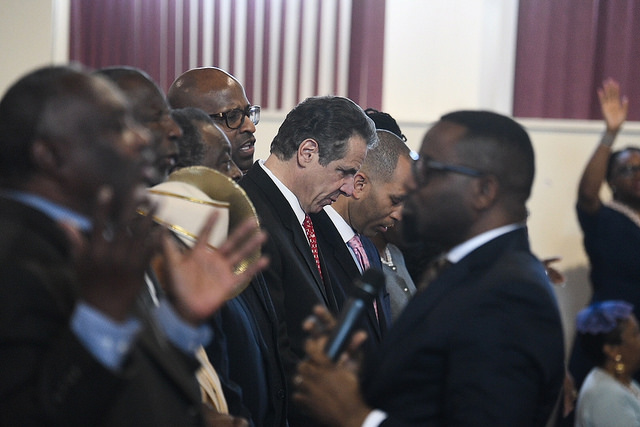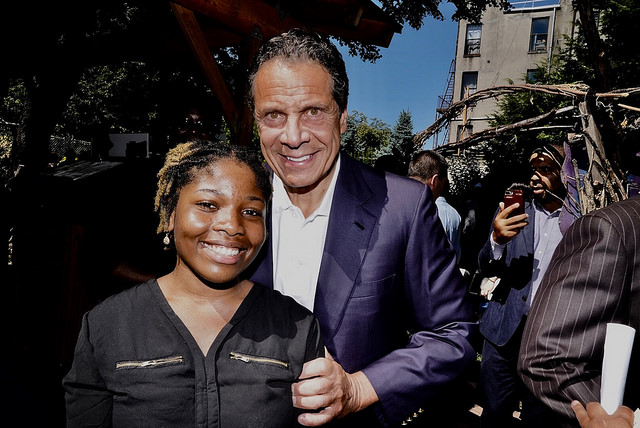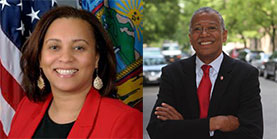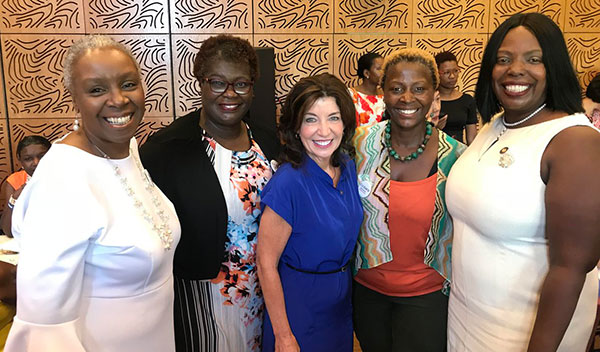Key to Victory, Black Voters Appear Solidly Behind Cuomo Over Nixon

Gov. Cuomo at God's Battalion Church in Brooklyn (both photos via Governor's Office)
On a recent morning at Sylvia's, the historic soul food restaurant in Harlem, caterer Lindsey Williams was weighing his upcoming vote in New York's gubernatorial primary election.
"I listened to Cynthia Nixon, and I liked what she was saying," said Williams, the 52 year-old grandson of Sylvia's founder Sylvia Woods.
Ultimately, however, Governor Andrew Cuomo had his vote, Williams said, citing his admiration for the governor's father, late Governor Mario Cuomo, and the younger Cuomo's years of experience.
"I commend [Nixon] for running," he said, "but I trust Cuomo."
That wariness towards the first-time candidate for elected office reflects a hurdle for the actor-turned-insurgent: winning over black voters, a bloc that has helped buoy New York Democrats from Mayor Bill de Blasio to Hillary Clinton and now, according to polls, strongly supports Cuomo, who is seeking a third term as governor.
In a July survey from Siena College, 75% of black likely Democratic primary voters polled said they would vote Cuomo over Nixon. Nineteen percent went with Nixon, and 6% were undecided. Of the total polled, 60% went with Cuomo to Nixon's 29%.
In a July Quinnipiac University poll, 61% of non-white voters approved of Cuomo, compared to 42% approval among white people.
Cuomo's favorability rating with black likely voters hit 79% in both June and July Siena polls. That number is more than double Nixon's -- and it bests Siena favorability ratings with the same demographic this year for de Blasio and U.S. Senators from New York Kirsten Gillibrand and Charles Schumer.
Cuomo's favorability rating with black voters in the polls is also higher than the 65% favorability rating with the same demographic for Public Advocate Letitia James, a Brooklyn native who would become the state's first black attorney general if she wins her race this year but is not nearly as well-known as Cuomo among voters across the state.
James and Cuomo have allied throughout their races and cross-endorsed, a partnership that may bolster the standing of both among black voters.
"We work with people who have worked with us," said Keith Wright, a Cuomo backer and former state legislator representing Harlem, the neighborhood that has long been a center of black power in New York. "Black people don't throw their votes away."
As for Nixon, Wright said: "I don't know the woman."
Longevity, Trust
In interviews, black Democratic party leaders, religious officials, and voters cited the Cuomo family's longevity in politics and the governor's reliability visiting their communities and pushing issues from gun-control to an outside monitor overseeing the New York City Housing Authority.
"People are familiar with him," said Brooklyn Assemblymember Rodneyse Bichotte, the first Haitian-American woman elected to the state Legislature. "It takes a lot of time to penetrate these communities and get name-recognition."
Ms. Bichotte endorsed Nixon's de facto running-mate -- Lieutenant Governor candidate Jumaane Williams -- but declined to endorse in the governor's race even as she is frequently critical of Cuomo.
"He's a charismatic man with a lot of experience," she said of the governor. "New Yorkers want to feel secure."
Wright expressed similar sentiments.
"He has been working on issues important to the black community for years, and his father before him," he said. "There's a track record, and a level of trust."
Nixon Camp Questions Polls
Nixon has sought to address issues of race head-on with a campaign video where she decries "an unjust system that criminalizes communities of color."
At the top of her campaign agenda is ending cash bail and legalizing marijuana, which she says would create a fairer criminal justice system. Her campaign has been centered on the notion that on criminal justice reform and many other issues, Cuomo has pushed through half-measures, if anything at all, to address racial, social, and economic inequality.
A spokeswoman said the Nixon campaign has knocked on doors in predominantly black and Latino communities, "and 70% of the people we talk to support Cynthia and Jumaane."
L. Joy Williams, a senior advisor to the Nixon campaign and president of the NAACP's Brooklyn chapter, said the polls are not capturing people Nixon is eying, who may be newly engaged in state politics and not regular voters.
"The community I am a part of in central Brooklyn is very dissatisfied in terms of affordability, access to services, the criminal-justice system," she said in an interview. "I know a number of people of color feel the same way. The question is whether they have been provided an alternate candidate to address these issues before."
But there isn't "some special thing you do for black voters," she added. "Sometimes campaigns make the mistake of thinking it's criminal justice and that's it. Going into communities, asking them questions, and then engaging people on the issues that matter to them is the key to success no matter the ethnicity."
Cuomo’s Inroads
Some two decades ago Cuomo's support among black voters was shakier. He ran a heated gubernatorial primary against then-Comptroller Carl McCall, who would have become the state's first black governor.
That race ended in Cuomo's defeat, while McCall went on to lose to incumbent Republican Governor George Pataki.
People familiar with the governor's thinking said Cuomo has been self-conscious about his standing among black voters ever since.
 "Since [the McCall race] there has been a realignment," said Reverend Alfred Cockfield II, the executive pastor at God's Battalion of Prayer in Brooklyn, a predominantly Caribbean African-American Church where Cuomo spoke in March. "Those hard feelings are washed away."
"Since [the McCall race] there has been a realignment," said Reverend Alfred Cockfield II, the executive pastor at God's Battalion of Prayer in Brooklyn, a predominantly Caribbean African-American Church where Cuomo spoke in March. "Those hard feelings are washed away."
Mr. Cockfield and other black supporters of the governor's cited a range of policy issues, from large initiatives like removing most minors from adult criminal proceedings for nonviolent crimes and appointing the attorney general to investigate police-related deaths, to smaller-scale ones like efforts to get more state contracts for minority-owned businesses.
Geoffrey Davis, a Democratic district leader in Brooklyn whose brother, a City Council member, was shot to death in 2003, cited Cuomo's gun control work.
"If someone is campaigning of course they'll say what they're going to do," he said. "We want you to say what you have done."
"This is serious business," he added. "Now we're going from 'Sex & the City' to reform. It sounds good, but we know what Governor Cuomo is doing, and we're satisfied."
‘A Subtle Disrespect’
When it comes to issues where Nixon has hit Cuomo hardest -- managing the city's ailing subways, and rooting out corruption in a state government where criminal convictions are common -- Cuomo supporters expressed skepticism she could offer improvements.
"It's a subtle disrespect," said Rev. Cockfield II. "Like they don't think we're wise enough to know she has not come to these communities before."
A minor debacle over Nixon's campaign kickoff location also made some black clergy leaders uneasy, they said.
She began her campaign at Bethesda Healing Center, a church in Brownsville, Brooklyn, but a religious leader there said church leaders thought the meeting would be private and were caught off-guard by the widely-publicized campaign event.
Organizers of the campaign kickoff apologized to church leaders for the misunderstanding, people familiar with the matter said.
A few weeks later, Cuomo invited a number of church leaders from Brooklyn, including an official at Bethesda Healing Center, to his office to highlight efforts like his "Vital Brooklyn" initiative, a multi-faceted state spending program in Brooklyn.
One attendee came away feeling that the governor is "an astute politician," this person said.
Support for Nixon
For some black leaders, the support for Cuomo is frustrating.
"With a $168 billion state budget there should be zero poverty in our community, " said Assemblymember Charles Barron, a Brooklyn Democrat and former member of the Black Panther Party. "It sickens me and saddens me that black leaders will give these two politicians a pass," he said, referring to Cuomo and de Blasio.
He chalked up their support to ambitious politicians who can be "easily bought off by a chairmanship," and voters too easily wooed by policies he said don't help enough.
Education activist Zakiyah Ansari disputed criticisms that Nixon has only come lately to issues affecting people of color, pointing to her years of pushing for more state support for public education.
"Through the advocacy work she was doing with her children, she thought about what it looks like for black and brown communities, who were getting even less," Ansari said.
Ansari, who introduced Nixon at her campaign kickoff and vouched then for her work in communities of color, described legislators darting away when they saw activists at the state Capitol until Nixon walked with them and "elevated our voices."
When Ansari walked 150 miles from New York City to Albany to push for more school spending, on the other hand, Cuomo's office called it a publicity stunt.
"That was the response we got."
Undecided in Harlem
At a recent 56th anniversary breakfast for Sylvia's, a voter registration drive was on hand and patrons encouraged each other to go to the polls this year.
Voters there said they were leaning towards Cuomo in the September 13 primary, but several attendees weren't sure.
Mike Nelson, a 60 year-old respiratory therapist registering voters outside the restaurant, said Nixon "hasn't knocked on my door," but he hasn't yet settled on Cuomo. "My vote is not easy to come by," he said.
Another Sylvia's diner, 67 year-old James Wynn, said he is undecided. His union, 32BJ, endorsed Cuomo, he said, "but I'd give Cynthia a chance."
[Read: In Wide Open Lieutenant Governor Primary, Hochul Targets Votes in Williams’ Backyard]
***
Mike Vilensky is a freelance journalist and student at Brooklyn Law School.
@GothamGazette
Max & Murphy Podcast: Manhattan State Senate Rematch Centered on Breakaway Democrats

Ben Max, left, of Gotham Gazette, and Jarrett Murphy, right, of City Limits
August 1, 2018 - Max & Murphy Podcast: The Epicenter of the Fight Over the IDC, with guests State Senator Marisol Alcántara and challenger Robert Jackson
 Marisol Alcántara won a close, competitive four-way Democratic primary in 2016 to take her seat in the state Senate, and promptly joined the controversial Independent Democratic Conference (the rogue Democrats who formed a coalition with the majority Senate Republicans), which had supported her in her narrow primary victory, including with hundreds of thousands of dollars in funding. Alcántara says she did not keep Democrats from the Senate majority and that she has accomplished a great deal in her first term.
Marisol Alcántara won a close, competitive four-way Democratic primary in 2016 to take her seat in the state Senate, and promptly joined the controversial Independent Democratic Conference (the rogue Democrats who formed a coalition with the majority Senate Republicans), which had supported her in her narrow primary victory, including with hundreds of thousands of dollars in funding. Alcántara says she did not keep Democrats from the Senate majority and that she has accomplished a great deal in her first term.
But Robert Jackson, who narrowly lost to Alcántara in 2016, is challenging her, and this time it's head to head and amid a major backlash against the IDC members, who returned to the mainline Democratic conference in April, in an apparent effort to quell primary challenges that have continued.
Alcántara then Jackson joined Max & Murphy for this week's podcast, originally aired on WBAI radio, where each also took listener calls. The podcast includes the full Max & Murphy hour on WBAI, including the two interviews, listener calls, and other discussion. Alcántara is on starting about five minutes in and Jackson is on starting at about 30 minutes into the hour.
Listen to the full conversation and let us know what you think -- we're on Twitter @TweetBenMax and @JarrettMurphy. You can listen to the show through the embedded audio below or download the episode wherever you get your podcasts, under "Max & Murphy," and listen to the show on Wednesdays at 5 p.m. on WBAI radio, 99.5FM or wbai.org
***
by Ben Max, Gotham Gazette
@tweetBenMax @GothamGazette
In Wide Open Lieutenant Governor Primary, Hochul Targets Votes in Williams’ Backyard

Lt. Gov. Hochul, center, in Brooklyn (photo: @KathyHochul)
Lieutenant Governor Kathy Hochul, in campaign mode, has appeared in the Bronx and Brooklyn several times over the past few weeks. The Democratic lieutenant governor, facing a challenge from Brooklyn City Council Member Jumaane Williams as she seeks a second term, has been spending more time in New York City as primary day gets closer.
Hochul’s focus on the city, and its communities of color in particular, are indicative of the importance of voters from the five boroughs, especially voters of color, in statewide Democratic primaries, and of her potential vulnerability to Williams, who has been an elected official in Brooklyn since 2010 and is black. A Siena Research poll released Tuesday -- just over six weeks until the September 13 statewide primary vote -- shows Hochul with a 30-21 percent lead among likely Democratic primary voters, with nearly half undecided. In other words, a wide open race.
Hochul seems to know it. The lieutenant governor spent Saturday July 28 at a “Brooklyn Women for Cuomo” event, July 22 in the Bronx with Assemblymember Nathalia Fernandez and City Council Member Vanessa Gibson, July 18 giving remarks at the Bronx Democratic Party’s Annual Gala, and July 14 in Brooklyn with State Senator Roxanne Persaud, attending a block party and the opening of Public Advocate Letitia James’ attorney general campaign office in Prospect Heights.
These events, among others both campaign and governmental -- in her role as lieutenant governor, she made an announcement at the Brooklyn Public Library main branch on Tuesday afternoon and appeared at a June gun control rally in the Bronx, for example -- have had Hochul appearing with black and Latino elected officials and posting photos with them to her social media feeds, and highlighting state investments in the boroughs with the highest proportions of people of color.
“Beautiful Saturday with my sisters in #Brooklyn – thank you for coming out to support @AndrewCuomo and I as we run for re-election,” Hochul tweeted on Saturday, with two photos attached, one of herself with four African-American women including Senator Persaud and Assemblymember Latrice Walker.
At the same time, Hochul has begun to zero in on Williams, returning some of his criticism of her as little more than a booster of Governor Andrew Cuomo, unwilling to be independent or speak up about corruption in state government. Hochul, who is from Erie County, where she was county clerk and a one-term member of Congress, has a conservative record on gun control and immigration that Williams has criticized and she has since distanced herself from, expressing more liberal views.
Hochul’s counterattacks have homed in on Williams’ own more conservative stances on abortion and marriage equality, and she has also taken him to task around his late and faulty campaign finance disclosures and unwillingness to release his past tax returns.
Last Tuesday, Hochul released a statement chastising Williams for failing to release his tax returns despite having introduced a resolution in the City Council calling for presidential candidates do so. “It's time for Councilman Williams to live up to his calls for transparency,” Hochul tweeted recently. “Stop trying to deflect and delay. Release your tax returns to the people of New York.”
She has also criticized Williams for issues with filing his campaign finance disclosure and for having to return $50,000 in illegal corporate donations. He has fired back saying that she has talked more about his campaign finance disclosures than about corruption in the state economic development programs that are key to her portfolio as lieutenant governor and have centered in Buffalo, which she represented in Congress.
In some ways, Hochul has appeared to embrace the challenge from Williams -- she calls herself a fighter and has said that while she thinks Democratic infighting hurts the party’s chances to flip Republican seats in Congress and the state Senate, she is happy to defend her record and Cuomo’s -- she enthusiastically supports the governor and explains her role as helping to get administration programs over the finish line and then to promote them around the state. While Cuomo has declined thus far to debate Cynthia Nixon in the gubernatorial primary, Hochul recently took to a Westchester stage with Williams for a forum, with only a moderator between them.
Any Democrat running for statewide office will have to spend a significant amount of time in New York City, with 55 percent of registered Democrats statewide residing within the five boroughs according to an April report from the State Board of Elections. But Williams may pose a different challenge to Hochul than did Tim Wu, Hochul’s 2014 Democratic challenger who ran alongside Zephyr Teachout, who took on Cuomo that year, as he was seeking a second term (Robert Duffy was Cuomo’s first-term lieutenant governor).
People of color, and particularly African-Americans, in the city play an outsize role in statewide Democratic primaries, the “base” of the party that is the most strongly identifies as Democratic.
“We can look at the record, just across the entire United States of America: black women are strong voters and strong leaders in our communities,” Brooklyn City Council Member Alicka Ampry-Samuel told Gotham Gazette on Monday. “Elected or not elected. And we usually are the ones that come out and help folks to get elected. Look at Alabama, right? And so, [Hochul] knows that, campaigns know that, and so it’s the same way you see Jumaane Williams now having conversations with women.”
In seeking to draw a wedge between the two candidates that will resonate with Democratic primary voters, Williams has pointed to Hochul’s votes in Congress for “concealed carry reciprocity,” allowing concealed carry gun permits to be valid in states without concealed carry (it did not pass the Senate), and for Hochul’s opposition to former Governor Eliot Spitzer’s plan to allow undocumented immigrants to obtain driver’s licenses.
“The lieutenant governor has no real record to speak of in 25 years,” Williams told Gotham Gazette near City Hall on Tuesday, after receiving the endorsement of the City Council’s Progressive Caucus Alliance. “There’s a lot of conversation of what their hands have been in, but my record is rich, in the past nine years, whether it’s communities of more color, whether it’s the LGBT community, whether it’s reproductive rights.”
Hochul has distanced herself from her more conservative past, criticizing the Trump administration’s child separation policy and unsuccessfully campaigning with Cuomo to get the state Senate to pass a “red flag” gun bill, while trumpeting Cuomo’s prior gun control victories. She has also expressed regret about, when Erie County Clerk, threatening to turn in to law enforcement any undocumented immigrants who may seek a driver’s license from her office. And she’s repeatedly pointed to Williams’ conservative personal views on abortion and marriage equality, which he has modified in recent years while touting his legislative record on the subjects as separate from his personal beliefs.
Not everyone is convinced that Williams is a threat to Hochul. Political scientist and Democratic strategist Bruce Gyory, of Manatt, Phelps, and Phillips and SUNY Albany, believes that Williams may not have the political capital among African-Americans necessary to mount a statewide challenge against Hochul.
“Does Jumaane Williams start out with overwhelming black support?” Gyory said in an interview with Gotham Gazette. “He didn’t back Bill Thompson [in the 2013 mayoral race], he backed de Blasio that time. He never endorsed Ken Thompson [for Brooklyn District Attorney] in the seminal reform race for black progressives in Brooklyn. He undercut black unity by not stepping out of the race for City Council [speaker] and backing [Robert] Cornegy, who had more support. And if you look at blacks in the Council, they were kinda begging him to do that, I’m sure they’re not thrilled that right after losing that race, he runs here for this.”
Gyory also noted that Williams has not endorsed Tish James, a fellow Brooklynite who would become the first black woman to hold statewide office, for Attorney General. Williams has endorsed Cynthia Nixon for governor and the two are both backed by The Working Families Party. He has also campaigned with Teachout, who is now running for attorney general, and the two seem set up to endorse each other.
Cuomo remains highly popular among black voters, and he, Hochul, and James have all endorsed each other. It’s not immediately clear that support from Cuomo and James will help Hochul among black voters, but it is exceedingly unlikely to hurt. The race may hinge in part on money, and there Williams appears at a significant disadvantage -- not only has Hochul raised more, but she has Cuomo’s immense largesse behind her as well, while Williams has never been a prolific fund-raiser.
"The Lieutenant Governor is very happy with where she stands in this race and the support that she is receiving statewide,” reads a statement from the Hochul campaign. “The poll clearly shows that the people of New York are happy with the record of accomplishments the Governor and Lieutenant Governor have achieved over the past four years. The Lieutenant Governor always campaigns hard and will be spending the next six weeks all over the state talking about that record."
Williams was also optimistic about the poll.
“The biggest poll for me is on election day,” he told Gotham Gazette. “So, don’t get too high or low on the polls in general. We’ve seen polls be completely wrong, so it’s hard. But I will say, it’s encouraging.” He noted that the high numbers of undecided voters in the poll -- roughly 50 percent of respondents -- as a good sign for his campaign.
Hochul’s campaign acknowledged that New York is a difficult state to become well known in, but expressed confidence that it will have the resources to continue to build her name recognition.
Gyory said that the swingiest demographic in statewide Democratic primaries is upper middle class, educated Catholic white women from the suburban counties; he said that Williams’ past personal opposition to abortion rights and LGBT rights would hurt him among that demographic.
He believes that Hochul is being tactically wise to target city voters and voters of color, explaining the recent spate of appearances in the city. While there are just over 300,000 registered Democratic voters in Hochul’s home county of Erie, which includes the state’s second-largest city of Buffalo, there are more than 3.4 million registered Democrats in New York City, including 1,096,765 in Williams’ home borough of Brooklyn.
“It would be hard to argue that she’s not being smart, that it’s not a good use of her time, to make him work as hard as he can for those votes in New York City,” Gyory said. “Because if she pins him down there, it’s tough to see him doing what he needs to do outside of New York City. So I think that’s a smart approach.”
***
by Ben Brachfeld, Gotham Gazette
@GothamGazette




